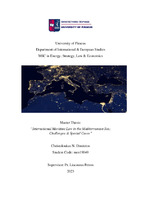| dc.description.abstractEN | Since ancient times, the Mediterranean has been characterized as the womb of all civilization. If the twists, knots, and crossings of human history are observed, the realization that more has happened in this enclosed sea, than any other part of the world, is a given. The first city-states as well as the first social structures were built and developed on the shores of this sea. Thus, the development of a law system that defined and protected human lives in these constructed societies was a matter of time.
From ancient Mesopotamia to the dawn of modern time history, laws, and frameworks, stabilized, constructed, and formed, one way or another, the nowadays existing environment of diversity and freedom, which still breathes, evolves and changes alongside human societies.
Considering the above, one can assume that when it comes to living in a well-structured social environment of any scale, this would eliminate the possibilities of humanitarian conflicts. Yet history can prove this utopic view a false lie. Through different social structures, the creation of many frameworks, each based on each state’s needs and culture were made, reaching the nowadays existing mosaic of sociocultural diversities.
The conflicts of interests in the Mediterranean are widely known on a global scale since the times Ancient Greeks and Phoenicians soared through this pond on the map. More specifically when focusing on modern time history, the movements of states, the financial, socioeconomic and energy issues are the moving factors of this never-ending boiling cauldron that is surrounded by almost twenty (20) nations each with their own history, views, and aspects.
The way these states are divided but at the same time dependent on one another, is the key to understanding the complexity of the situation and the entangled conflicts of political interest in the area. The surrounding states can be divided in three separate groups based on the continental topography of each one, the European, the Asian, and the African states. These groups are uniquely harmonic in sharing the same attributes and aspects but chaotically in cooperating and coexisting with one another. | el |



